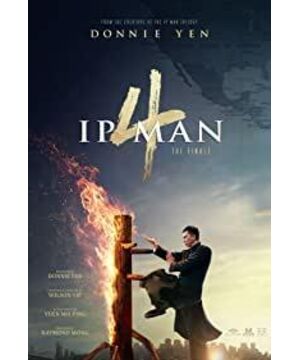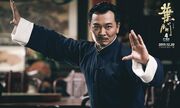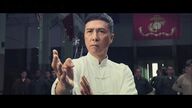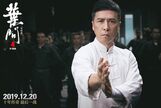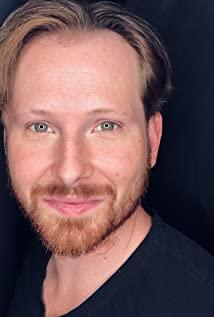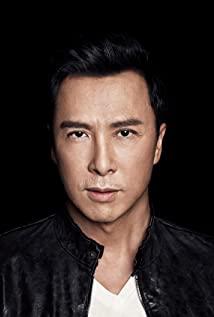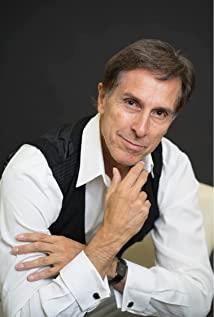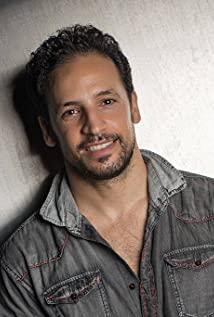The release of "Ip Man 4", to a certain extent, has the same meaning as "Star Wars: The Rise of Skywalker" next door- they may both be the end of an era .
"Star Wars 9" puts an end to the nine film epics of the Skywalker family throughout the beginning and the end. After watching "Ip Man 4", I believe many people will also ask: Will this be the end of a kung fu movie? ?
It seems a bit exaggerated, because our domestic movies never lack action movies, but I humbly think that those works are different from the so-called Kung Fu movies.
For example, Zhang Yimou's "Shadow" and Jiang Wen's "Evil Do Not Suppress Righteousness", etc., although both have important action scenes, their action elements, like art and photography, are completely subordinate to narrative and cannot be regarded as true. "Kung Fu Movie".
For example, the "Xiu Chun Dao" series is a rare domestic action movie of high quality in recent years, but its action design has incorporated various martial arts elements such as Muay Thai, wrestling, and Jiu-Jitsu, which is somewhat different from traditional Kung Fu movies.
As for Tsui Hark's "Di Renjie Series", although there are still Kung Fu scenes with traces of martial arts in Hong Kong movies, Old Monster Xu has already turned his attention to the application of special effects.
The kung fu movies in my mind are movies whose main purpose is to show Chinese martial arts. The status of kung fu in the film must even match the importance of the story. The presentation of martial arts scenes must be highly appreciative and not Only rely on the use of shots and editing to complete-this undoubtedly puts forward high demands on the actors.
After filtering according to this standard, you will find that in today's Chinese-language movies, there is really only one sign of the "Ip Man" series left. Although Jackie Chan is still adventurously taking risks, he is almost impressed, while Wu Jing is more keen to try various types of commercial films.
Therefore, when we watch "Ip Man 4", what we see is kung fu, which is Yen Zidan, and Yuan Heping.
In "Ip Man 4", the people that Ip Man "fighted" include both Chinese boxers in Chinatown, small gangsters on American campuses, karate masters and U.S. Marines officers, just like in the past. Like the "Ip Man" series, the martial arts movements designed by Yuan Heping for Donnie Yen are "targeted" .
When Ye Wen hit the gangsters, he was very restrained, and they were all teaching attacks, such as pulling ears and spanking. This is to express that the gap between his opponent and Ye Wen is so great that Ye Wen is able to do well in the fight.
When competing with foreign karate masters and American officers, the attacking rhythm and skill naturally came up.
Some netizens compared "Ip Man 4" with the anti-Japanese drama, which is a bit exaggerated. Ye Wen didn't have the magical skill of flying over the wall, and he didn't use flesh and blood to deal with tanks and cannons. It is worth noting that the story of "Ip Man 4" took place in the 1960s. The history of Ip Man was already an ancient year, and even if the protagonist's aura is strong, he did not make him look like before. As in the three parts, it is against the sky.
More importantly, Ye Man in "Ip Man 4" also has the setting of suffering from cancer, and his body functions are naturally more fragile. In terms of strength, battery life and anti-strike ability, Ip Man is inferior to his opponents. This makes it impossible for him to conduct effective "equivalent exchanges" with opponents in combat, and it is even more difficult to "take advantage".
Therefore, we have seen that Ye Man in "Ip Man 4" often suffers from out of breath when confronting a master. This is rarely seen in the first three parts, and it is undoubtedly a performance of Ip Man's decline in physical fitness. .
In the "Battle of Life and Death" with karate masters and American officers, Ip Man's tactics not only fully demonstrated the close-knit short-playing characteristics of Wing Chun, but there are also few so-called "masters". Some more, more practical and fierce styles of play.
For example, the "marker" used by Zhang Tianzhi during the "Civil War of Wing Chun" in "Ip Man 3" to hurt the enemy's eyes is a kind of killer move in the line of Wing Chun, and it is generally not used when using Wu to make friends. use. "Ip Man 3" expresses Zhang Tianzhi's utilitarianism in this detail. In "Ip Man 4", the "old age and declining" Ye Wen not only used the "standard hand", but even more "under three indiscriminate". "Fuck Yin Legs" are all used.
This kind of action setting, on the one hand, reflects the decline in Ye Wen's physical function, and he has to use more abundant skills to make up for it, and on the other hand, it is also a response to the enemy's cruel and malicious attacks.
Yen Zidan's solid foundation and Yuan Heping's reasonable design finally made Ye Wen in "Ip Man 4" still "can play" and play well, and it is also worth noting that there are other action actors' performances.
Chen Guokun played Bruce Lee again with good results. In fact, he is also the most suitable actor to play Bruce Lee at this stage. "Ip Man 4" also gave him enough space to show his strength.
Chen Guokun not only reproduced the classic picture of Bruce Lee in the American karate competition, but also fully demonstrated Bruce Lee's martial arts style in a street fighting, which can be called one of the most exciting martial arts scenes in the film.
Another notable actor is Wu Yue. This time he plays Wan Zonghua, the Chinese leader of Chinatown, who is a Tai Chi master himself.
Friends who have watched the film may have noticed that both in the competition with Ye Man or in the competition with karate masters, Wan Zonghua, played by Wu Yue, has shown a strong desire to attack and extremely tough. The fighting style is even bigger than Sammo Hung in "Ip Man 2".
Do you think this is quite different from our impression of Tai Chi's style of "stopping statically, overcoming strength with softness, and restraining others with late hair"?
Our common sluggish health-preserving Taijiquan is naturally different from the Taijiquan in real fighting, but if you carefully observe the movements designed by Yuan Heping for Wu Yue, you will find that although Wu Yue beats fiercely, Taijiquan" The martial arts thoughts of "advance to the situation and take advantage of strength" are actually reflected, and Wu Yue is also a master of Bajiquan.
To allow the audience to appreciate the other side of Tai Chi, Wu Yue's performance is, to a certain extent, a small breakthrough.
Finally, talk about the story.
Some people think that kung fu movies often only focus on "playing" and ignore literary drama. In fact, they are biased. In addition to being unique in martial arts, the emphasis on characterization and emotional sublimation is also remarkable in the "Ip Man" series.
The story of "Ip Man 4" seems to be in the same line as the previous one. The first part hits Japanese in the mainland, the second part hits foreigners in Hong Kong, and the third part hits Thais and blacks in Hong Kong plus the "Wing Chun Civil War". Four parts finally "out of Asia" and came to the territory of the United States.
But "Yp Man 4" really came down in the same line, in fact, the shaping of the character of Ye Man, the process of "making Ye Man a person" step by step.
We know that in the first two "Ip Man" series, Ip Man's struggle was for national justice and self-esteem. The character image is very tall, and there is a tendency that "divine nature" overshadows "human nature".
In the third part, the director Ye Weixin began to "shrink" the scope of Ye Man's activities, and the object of Ye Man's protection became a school or his own family. The wife's feelings have been sublimated.
In "Ip Man 4", Ye Wen's emotional entanglement is tied to his youngest son, Ye Zheng. The boy who lost his mother has entered a rebellious adolescence. Although Ye Wen as a father loves his son, he is still unable to communicate with his son. It is a very ordinary family story, just like you want to pursue your music dream but your parents I have to ask you to take a civil service exam.
Ye Wen, who went to the United States to help her son find a school, gradually understood the child's thoughts during her dealings with Wan Zonghua's daughter, Wan Ruonan, and also understood that as a parent, she should not control her children's life decisions, but should support them. In the end, after returning to China, Ye Man expressed respect for his son's choice, and the father and son also completed a reconciliation.
In fact, whether it is Ye Wen's struggle against racial discrimination across the ocean, or the change in the father-son relationship with his son, it reflects a core of thought that runs through the four "Ip Man" series, which is " respect ."
From Ye Wen's famous saying "There are no people who are afraid of wives in this world, only people who respect their wives" to Sammo Hung's "I can tolerate for life, but insulting Chinese martial arts is not enough", to what Ye Wen said in the middle of this movie "The Original Mind of the Martial Arts Scholar", the four "Ye Wen", finally showed a slightly Confucian spirit of martial arts:
The Confucian can be close but not robbed, close but not coerced, and killed but not humiliated.
View more about Ip Man 4: The Finale reviews


